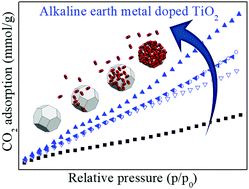Energetics of CO2 and H2O adsorption on alkaline earth metal doped TiO2
Abstract
The process of CO2 and H2O adsorption on the surface of nano-oxide semiconductors is important in the overall performance of artificial photosynthesis and other applications. In this study, we explored the thermodynamics of CO2 and H2O adsorption on TiO2 as a function of surface chemistry. We applied gas adsorption calorimetry to investigate the energetics of adsorption of those molecules on the surface of anatase nanoparticles. In an attempt to increase TiO2 surface affinity to CO2 and H2O, TiO2 was doped with alkaline earth metals (MgO, CaO, SrO, and BaO) by manipulating the chemical synthesis. Adsorption studies using diffuse reflectance infrared spectroscopy at different temperatures indicate that due to the segregation of alkaline earth metals on the surface of TiO2 nanoparticles, both CO2 and subsequent H2O adsorption amounts could be increased. CO2 adsorbs in two different manners, forming carbonates which can be removed at temperatures lower than 700 °C, and a more stable linear adsorption that remains even at 700 °C. Additionally to the surface energetic effects, doping also increased specific surface area, resulting in further improvement in net gas adsorption.



 Please wait while we load your content...
Please wait while we load your content...